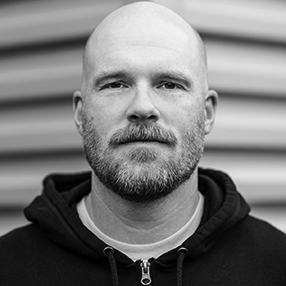for Major and Didi Jackson
There’s no suffering among dandelions,
in the way the corral gate swings open
or how the gears stay up late
to keep the wrists of the dead company.
And there’s no suffering in silt or the word marsh
or in the quadratic equation, which scurries
beneath the floorboards of my thought
like a mouse drunk on plum wine.
There’s no suffering in the steam backlit
and seared into the world at an early hour
with the horse as its guide. And there’s no suffering
in lag bolts or u-joints, nor in the sexed-up shadows
of grain elevators. There’s no suffering
in the verb itself—to suffer—which, in my kin’s tongue
means charged by the sight of an owl,
let loose from a barbed hook, returned
to the reservoir of the mind.
Today, I’m a chemical emulsion
that burns light onto paper, a three-cent stamp
honoring a woman whose name
is cloth spread throughout a meadow,
mortar setting up in a constant breeze.
The mountain air takes a handful of memories
from my chest, spreads them before me
like pewter figurines until I feel
like a tube of lipstick with an erotic name
or the long vowels in a wave’s trough,
all hum and echo. Friend, I’m both
a keyhole in a star and the key chained
to a young boy’s neck. I’m the thistle and its bloom,
father rack and pinion son, gravel and its dust.
And here, before you now, I’m on a measure
of consonants gnawing the green roots
from a blinded moon, where I say to hell with kings
and jeweled blood, for in this kingdom
suffering shall be, but never be invented.
Copyright © 2022 by Michael McGriff. Originally published in Poem-a-Day on November 2, 2022, by the Academy of American Poets.
“With some distance, I can see that ‘Inversion’ wants to know who causes suffering in the world. Of course, we’re all vectors for suffering. We’re human, after all; we fight each other for careers, sparkly zip codes, healthcare, social media status, and all the rest of the stuff that makes us good capitalists. But maybe there are moments when we mindfully refuse to add additional suffering into the world. I’d like to think I’m a person like that. In this poem, I’m trying to find meaning in that desire through the images that haunt me.”
—Michael McGriff

